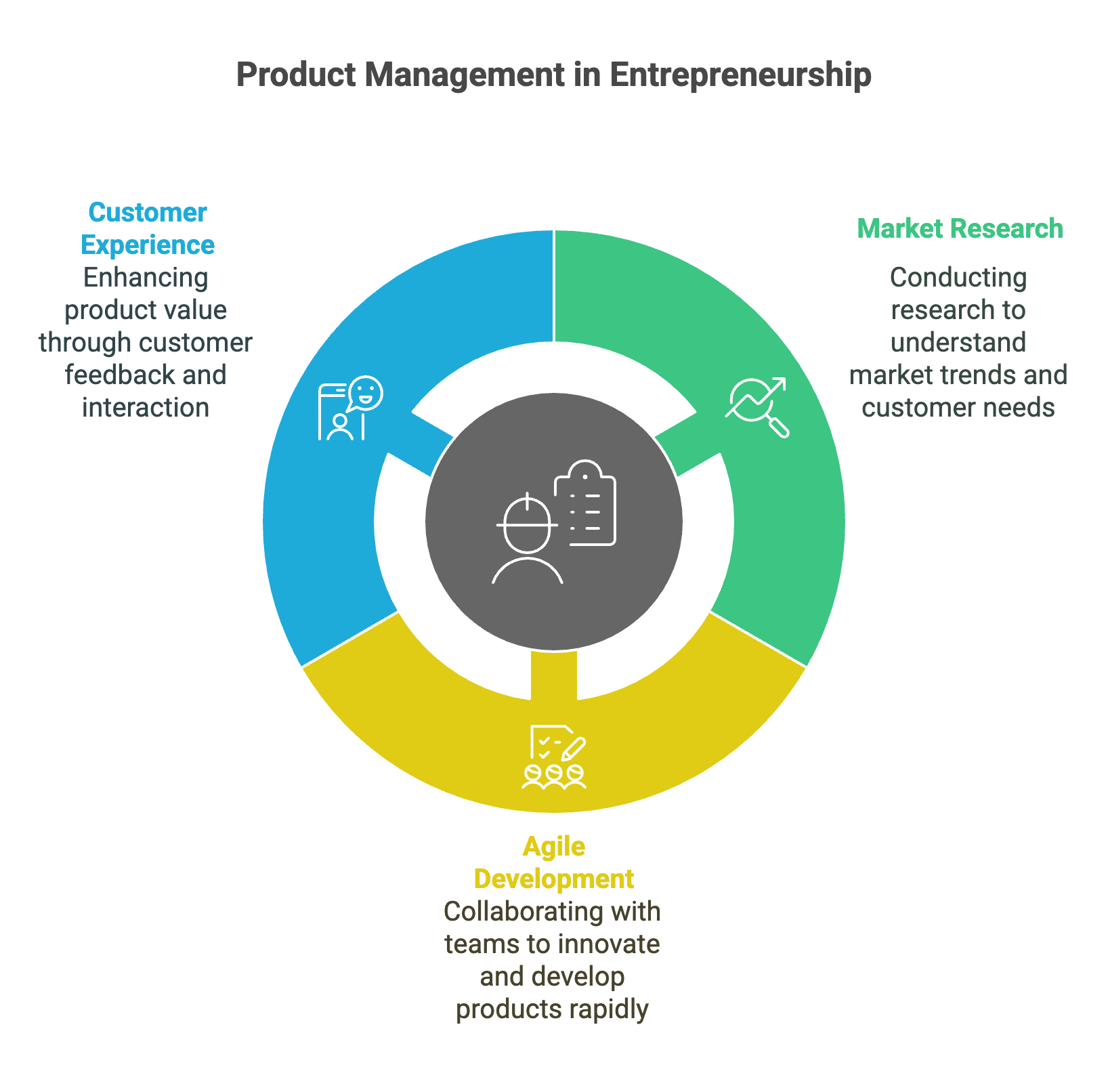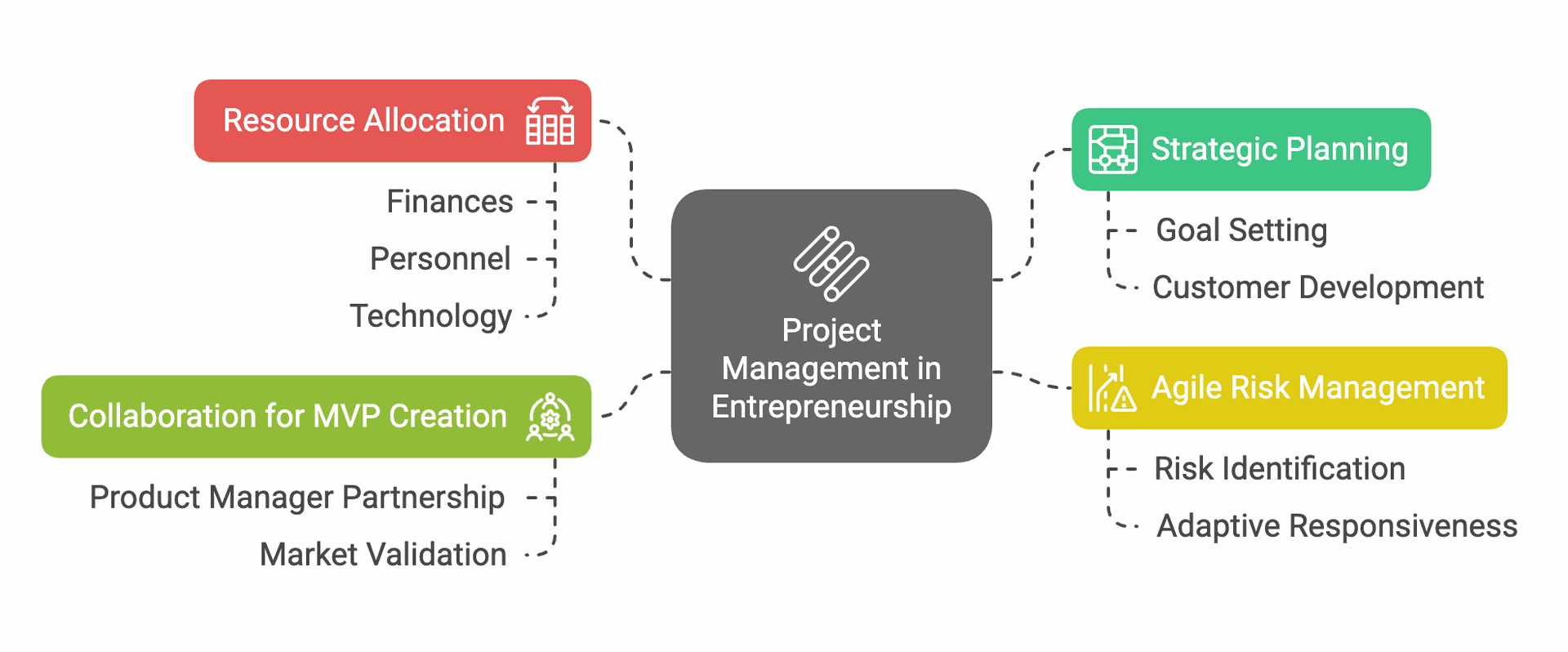In the ever-changing world of entrepreneurship, effective Product and Project Management play crucial roles in achieving success. Entrepreneurs are visionaries, always working to turn their ideas into reality. However, without a structured approach to Product and Project Management, even the most innovative ideas might fall short in the fiercely competitive market. This article explores the important role of Product and Project Managers in entrepreneurship and emphasizes the need to find a balance between strategic vision and efficient execution.
Understanding Product Management in Entrepreneurship
Product management in entrepreneurship focuses on delivering value to customers through the creation and launch of innovative products. In the context of Customer Development, the well-known methodology for discovering and validating a scalable business model through direct engagement with potential customers, the role of the product manager extends to discovering and confirming customer needs.

1.- Market Research and Understanding Customers
To create successful products, entrepreneurs need a deep understanding of their target market. Product Managers conduct market research, gather insights from customers, and analyze trends to grasp customer needs and preferences. This information forms the basis for product development, ensuring that the final product meets customer expectations and fits the market.
2.- Agile Product Development and Innovation
Entrepreneurs thrive on innovation, and effective Product Management drives this process. In alignment with the entrepreneurial Project Manager's efforts, the Product Manager collaborates with cross-functional teams to turn ideas into tangible products. Embracing Agile frameworks, such as Scrum, allows for swift and iterative product development, moving away from traditional waterfall approaches.
3.- Customer Experience and Feedback
Putting customers at the center is vital for Product Management in entrepreneurship. Product Managers actively seek customer feedback, analyze user experiences, and make improvements based on customer input. This iterative approach lets entrepreneurs refine their products to address changing market demands and validate their solutions.
Understanding Project Management in Entrepreneurship
Project Management in entrepreneurship involves strategically organizing and executing tasks to achieve specific objectives within set time and budget constraints. While traditionally, a Project Manager ensures projects stay on track, within entrepreneurship and guided by customer development principles, this role takes on a broader dimension. The entrepreneurial Project Manager works closely with the product manager, both focused on creating a Minimum Viable Product (MVP) that matches the business model. This iterative process, fueled by rapid refinements and valuable customer feedback, validates market assumptions effectively.

1.- Strategic Planning and Setting Goals
Effective Project Management in entrepreneurship relies on thorough strategic planning and clear goal-setting. Entrepreneurs must define clear objectives for each project, mapping out the path needed to achieve these goals. Establishing tangible, achievable, and measurable benchmarks acts as a comprehensive roadmap, guiding efforts toward successful outcomes. Importantly, this strategic direction remains closely linked to the overall framework of customer development initiatives, ensuring alignment with evolving customer needs.
2.- Resource Allocation and Optimization
Allocating resources wisely, a crucial aspect of Project Management, is especially important in start-ups where resources are often limited. The entrepreneurial project manager becomes a careful steward, efficiently directing resources, including finances, personnel, and technology, to maximize efficiency and achieve desired outcomes. This resource management, aligned with customer development efforts, enhances the search for optimal market opportunities.
3.- Agile Risk Management
In the complex landscape of entrepreneurship, marked by uncertainties, traditional risk management may not suffice. The entrepreneurial Project Manager identifies potential risks and adopts an agile risk management approach, characterized by rapid experimentation, continuous learning, and adaptive responsiveness, all centered around customer feedback. Embracing uncertainty and continuous iterations empowers entrepreneurs to navigate uncertainties with confidence.
4.- Collaboration for Minimum Viable Product (MVP) Creation
Collaboration between the entrepreneurial Project Manager and the Product Manager is pivotal, culminating in the creation of a Minimum Viable Product (MVP). This partnership combines strategic insight with technical expertise. The entrepreneurial project manager leverages Agile methodologies, seamlessly integrating them with the product manager's understanding of customer preferences and market trends. Together, they carefully tailor the MVP to align with the business model. Through rapid refinements and dynamic customer feedback, this joint effort serves as a litmus test, meticulously confirming market assumptions and validating the product's viability.
By following these Project Management principles, combined with a harmonious interaction with the intricacies of Product Management, entrepreneurs can navigate entrepreneurship with resilience and strategic awareness. These principles pave the way for visionary ideas to materialize into tangible successes, all while maintaining a strong focus on agile execution and customer-centricity.
Key Takeaway
Effective Product and Project Management are essential in the entrepreneurial world to turn visionary ideas into reality. Entrepreneurs need to strike a balance between strategic vision and agile execution to thrive in the competitive market. Product Management provides the framework to understand the market, create customer-focused products, and validate solutions, while Project Management ensures that strategic goals are pursued with focus and efficiency. By mastering these essential elements and adopting a customer-focused, agile approach, entrepreneurs can navigate the entrepreneurial journey confidently and achieve their goals with purpose and precision.